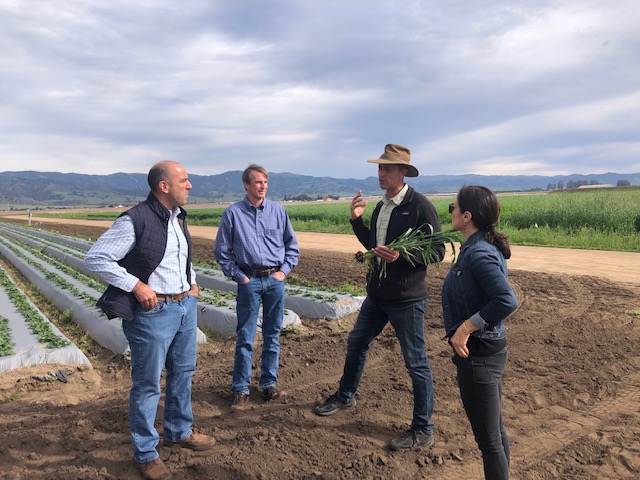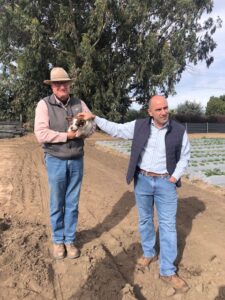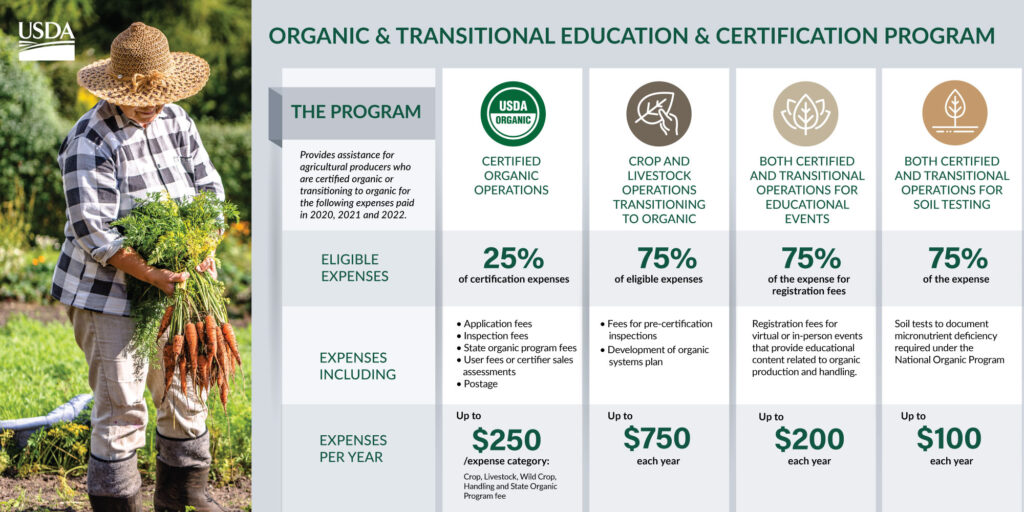FOR IMMEDIATE RELEASE
As the Organic Industry Booms, Grower Challenges and Seed Needs Loom Large
Two new assessments underscore the need for targeted investments in organic research
(SANTA CRUZ, Calif., March 15, 2022) — Organic Farming Research Foundation (OFRF) and Organic Seed Alliance (OSA) are proud to announce the release of the National Organic Research Agenda (NORA) and State of Organic Seed (SOS). The two reports are published every five years to examine organic farming challenges across the U.S., identify research needs, and better understand the organic seed needs of producers.
The organic food market experienced incredible growth in 2020, with sales surpassing $56 billion, a 12 percent increase from 2019. The organic seed market has also grown in recent years due to this demand for organic food as well as a dramatic rise in gardening during the COVID-19 pandemic.
The reports released today provide comprehensive assessments and recommendations for ensuring the ongoing growth and success of organic farming in the U.S. Specifically, NORA details organic research needs with the goal of informing future investments that support the success of organic farmers and ranchers and those transitioning to organic production. SOS details trends in organic seed sourcing, challenges faced by organic seed producers, public investments in organic plant breeding, and more.
In 2019, OFRF and OSA were jointly awarded funding from the U.S. Department of Agriculture’s (USDA) National Institute of Food and Agriculture’s (NIFA) Organic Research and Extension Initiative (OREI) for the NORA and SOS projects. The following year, OFRF and OSA launched a national survey of organic farmers and ranchers, in addition to a survey targeting transitioning-to-organic operations, to better understand these producers’ challenges, needs, and perspectives. More than 1,100 producers responded to the survey and an additional 100 producers attended 16 listening sessions across the country. Overall, farmer participation reflected the same demographics of those in the U.S. farming sector as documented in the USDA’s National Agricultural Statistics Services 2019 Organic Survey.
Highlights from the National Organic Research Agenda
“Organic farming has been historically under-invested in, in terms of research, education and extension,” says OFRF Executive Director Brise Tencer. “The 2022 National Organic Research Agenda presents incredible feedback directly from organic farmers and provides a compelling roadmap for how to best support the growth of this important sector of agriculture.”
Survey respondents provided input and perspectives on their current organic production systems, including the use of regenerative soil health management practices, water conservation, organic inputs, and organic seed. Findings confirm that organic producers lead the nation in adoption of soil health management and climate-friendly practices. The 2022 NORA also examines current farmer concerns in organic agriculture, farmers’ preferred sources and modes for information-sharing, and summarizes the impacts of COVID on organic producers.
Respondents also shared their production and non-production challenges, which OFRF then analyzed by region, farming experience, and race/ethnicity. This particular NORA compares the experiences of both Black, Indigenous, and People of Color (BIPOC) and White farmers, and reveals BIPOC producers are experiencing many organic production challenges and at a higher rate than their White counterparts.
In addition to identifying gaps in current organic and transitioning-to-organic production challenges, NORA highlights farmer-identified solutions and strategies shared during its focus group discussions. NORA also provides comprehensive recommendations to guide OFRF’s research and policy initiatives. Proposed investments and focus areas include, but are not limited to, technical assistance, organic research, and racial equity programming.
Highlights from State of Organic Seed
The State of Organic Seed report is part of an ongoing project to monitor organic seed systems in the U.S. More than ever, organic seed is viewed as the foundation of organic integrity and an essential component to furthering the principles underpinning the organic movement. Every five years, SOS serves as a progress report and action plan for increasing the organic seed supply while fostering seed grower networks and policies that aim to decentralize power and ownership in seed systems.
The update released today includes substantially more data than the 2016 report, including a deeper examination of organic seed producer/company challenges and their networks. This and other data can be explored through an interactive website where users can sort five data sets by region, crop type, and other identifiers (see: https://organicseed.shinyapps.io/SOSData/).
Organic farmers produce food differently, and that means they need different seed for the crops they grow – seed developed to thrive without synthetic chemical fertilizers and pesticides, and adapted to their local climate and soil conditions. Organic seed is also a regulatory requirement. The USDA’s National Organic Program requires the use of organic seed when commercially available.
Unfortunately, OSA’s recent findings show no meaningful improvement in organic producers using more organic seed compared to five years ago. This lack of progress puts at risk the viability of the organic seed industry and the integrity of the organic label. In particular, the largest organic operations still use relatively little organic seed, and data suggests that organic certifiers’ enforcement of the organic seed requirement could be strengthened.
However, OSA’s data points to progress in other areas, including public investments going toward organic plant breeding and other organic seed research initiatives. More than $39 billion have been invested in these types of projects in the last five years alone. This represents the largest public investment in organic seed systems that OSA has ever recorded. More organic plant breeders are having success releasing new varieties as well.
“The findings are clear, and they underscore the urgent need to modernize organic seed policy, support the success of existing and new seed producers, and confront the dire risks climate change poses to our seed supply,” says OSA’s Kiki Hubbard, lead author of the report.
Each report is available online at www.ofrf.org/research/nora/ and www.stateoforganicseed.org/.
###
Download this Press Release (214 KB, PDF)
Media Contacts
Organic Farming Research Foundation, communications@ofrf.org
Kiki Hubbard, Organic Seed Alliance, kiki@seedalliance.org, (406) 544-8946
About Organic Farming Research Foundation
Organic Farming Research Foundation (OFRF) works to foster the improvement and widespread adoption of organic farming systems. OFRF cultivates organic research, education, and federal policies that bring more farmers and acreage into organic production.
http://www.ofrf.org/
About Organic Seed Alliance
Organic Seed Alliance (OSA) works nationally to advance ethical seed solutions to meet food and farming needs in a changing world. Through research, education, and advocacy, OSA fosters organic seed systems that are democratic and just, support human and environmental health, and deliver genetically diverse and regionally adapted seed to farmers.
https://seedalliance.org/
 Dominica Navarro Martinez (she/ella/they) is OFRF’s new Deputy Director. She brings to this role an extensive background in nonprofit management, finance, administration, and strategic programmatic development. She has direct organic farming experience and previously worked for OFRF in an office management and programs capacity from 2015-2018.
Dominica Navarro Martinez (she/ella/they) is OFRF’s new Deputy Director. She brings to this role an extensive background in nonprofit management, finance, administration, and strategic programmatic development. She has direct organic farming experience and previously worked for OFRF in an office management and programs capacity from 2015-2018.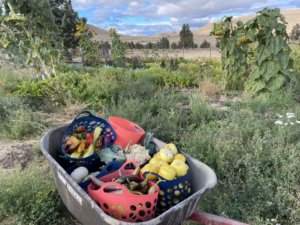 Tell us about yourself.
Tell us about yourself. Organic agriculture is important to me because it protects people and the planet. I personally don’t agree with agricultural systems that depend upon toxic pesticides to grow food. Food is meant to nourish us, not make workers and consumers sick or poison natural ecosystems. Organic research is especially important because we must also learn to meet the growing demand for organic foods and growing pest pressure.
Organic agriculture is important to me because it protects people and the planet. I personally don’t agree with agricultural systems that depend upon toxic pesticides to grow food. Food is meant to nourish us, not make workers and consumers sick or poison natural ecosystems. Organic research is especially important because we must also learn to meet the growing demand for organic foods and growing pest pressure. Who is your farming, research and/or food hero – and why?
Who is your farming, research and/or food hero – and why?


 When she isn’t working, Thelma enjoys cooking and baking, rock climbing, and making art. She resides in Florida with her family and dog Mocha (a Boykin Spaniel and Lab mix), and visiting the Everglades National Park (both pictured right).
When she isn’t working, Thelma enjoys cooking and baking, rock climbing, and making art. She resides in Florida with her family and dog Mocha (a Boykin Spaniel and Lab mix), and visiting the Everglades National Park (both pictured right). My farming and food-system hero is Leah Penniman, the founder and co-Director of Soul Fire Farm and author of Farming While Black. Leah is a pioneer, a visionary, and a doer, and I find her tenacity and drive inspiring. The mission and work being done at Soul Fire Farm is honorable and just, and to top it all off, she is a kind and compassionate human with a stellar smile.
My farming and food-system hero is Leah Penniman, the founder and co-Director of Soul Fire Farm and author of Farming While Black. Leah is a pioneer, a visionary, and a doer, and I find her tenacity and drive inspiring. The mission and work being done at Soul Fire Farm is honorable and just, and to top it all off, she is a kind and compassionate human with a stellar smile.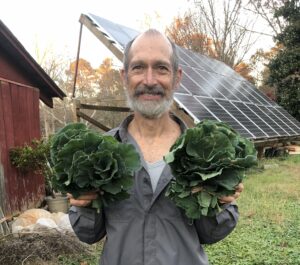 Organic farmer and
Organic farmer and 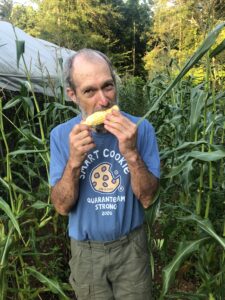 To participate in the program, eligible operations must submit their OCCSP applications to State agencies or to their local
To participate in the program, eligible operations must submit their OCCSP applications to State agencies or to their local 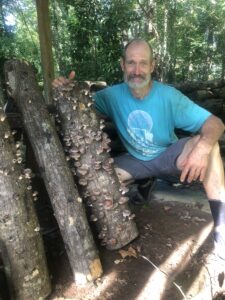 Though the operational decision to downsize reflects a personal interest for Hager and his wife to invest their time elsewhere, Hager admits that running a farm has become increasingly more stressful. “Every year, there seems to be a new requirement to get certification,” says Hager. “The ‘time-cost’ and financial cost continues to go up on top of the problems with climate and changing markets. The increasing complexity of certification adds a lot of stress to being a farmer.”
Though the operational decision to downsize reflects a personal interest for Hager and his wife to invest their time elsewhere, Hager admits that running a farm has become increasingly more stressful. “Every year, there seems to be a new requirement to get certification,” says Hager. “The ‘time-cost’ and financial cost continues to go up on top of the problems with climate and changing markets. The increasing complexity of certification adds a lot of stress to being a farmer.”